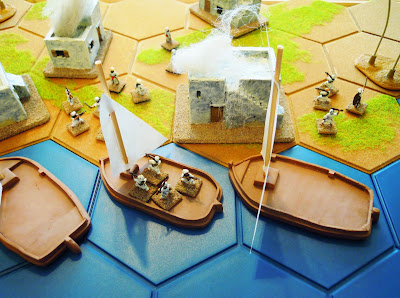In the aftermath of the Khedive's return to full power in Zubia there was a short period of hiatus. It was during this period that some of the riverine tribes in the south of Zubia began to clamour for greater independence from the centralised control exercised by the Khedive's government in Zubairo.
A map of Zubia.
Whilst General Ali Nasir had been in
de facto control, the riverine tribes had enjoyed a degree of autonomy and – more importantly – they had been exempted from paying certain taxes in exchange for supporting the General's policy of breaking all ties with Fezia. '
Zubia for the Zubians' had been their slogan ... and now it appeared that not only was the Fezian Khedive back in power, but he was reliant on the support of the
ferengi.
A map of Southern Zubia.
The revolt begins
The revolt actually began just outside Adydos, a village some way from the River Zub. A tax collector, escorted by members of the Zubian Gendarmerie (all of whom were ex-members of the old Zubian Army) ...
... were attacked and killed by local tribesmen.
This calamity did not come to the notice of the local Governor – who was based in Wadi Halfwa – until some days later, when a large number of armed tribesmen began gathering outside the town.
The Governor sent an urgent message about the situation to Zubairo
via the newly installed electric telegraph, but before the authorities in Zubairo could reply, the line went dead.
The Khedive’s advisers assumed that the sudden cessation in communications between Zubairo and Wadi Halfwa was due to a technical problem, but the truth was that the line had been cut between Wadi Halfwa and Massala.
In Wadi Halfwa the Governor mobilised his garrison of Gendarmes and prepared his somewhat meagre defences, which he fully expected would be sufficient to see off the threatening tribesmen … but he had forgotten that these were riverine tribesmen who were used to using the river as their main means of transport, and who had every intention of using their knowledge of river transport to their own advantage. All of the town's defences faced inland, and not towards the river ...
... and it was from the river that the main threat came!
The two sailing craft that were armed with cannon were able to dominate the centre of the town and this allowed the sailing craft loaded with tribesmen to outflank Wadi Halfwa's defences.
As the tribesmen swarmed ashore, those outside the walls mounted their attack, and despite trying to hold off both sets of attackers ...
... the defenders of Wadi Halfwa were soon fighting for their lives throughout the town.
The result was inevitable, and by sunset the Governor's severed head was on display above the entrance to the town. Most of the defenders died fighting for their lives, and only a very few were taken captive ... and were immediately enslaved.
After a few days of captivity one of the captured Gendarmes did manage to escape, and a week later – and after a tortuous and dangerous journey along the River Zub – he eventually managed to reach the town of Abou Nasir.
The evacuation of Abou Nasir
When news of events in Wadi Halfwa reached Abou Nasir, and after passing on this news to Massala by electric telegraph, the town's mayor immediately began to prepare to evacuate the entire population. Unlike Wadi Halfwa the town had no proper garrison or defences, and the mayor guessed that the riverine tribesmen would reach the town before any units of the Khedive's army arrived to defend it.
As luck would have it two of the Zub Steam Navigation Company's fleet of river steamers were alongside the town's wharf, and they were commandeered by the mayor. The mayor and more affluent members of the town's population (i.e. those who could pay) were soon aboard the steamers, which set sail once the sails of the riverine tribesmen's sailing ships came into sight.
The rest of the town's population were left to fend for themselves, and those who did not try to escape along the river's edge or across the desert began looting the town and setting fire to its buildings.
As a result the town was already well ablaze by the time the riverine tribesmen disembarked.
Angered by what had happened (they had hoped to capture much-needed supplies), the tribesmen slaughtered everyone they could find.
The defence of Massala
The Khedive's army had been alerted to the fact that there might be a problem in the south when the electric telegraph connection with Wadi Halfwa had been cut, and the subsequent telegraphed message from the mayor of Abou Nasir confirmed the fact that a full-blown revolt was in progress.
Although Massala had no physical defences, the Governor of Massala did have some troops of the newly-trained Zubian Army at his disposal. He immediately ordered the evacuation of all civilians from the town and the digging of defensive earthworks that covered the river and landward approaches to Massala.
He also sent a request to Zubairo for whatever reinforcements were available to be sent to Massala as quickly as possible. The defenders than sat back and awaited the arrival of the riverine tribesmen.
It was not long coming.
The attack was made from both the river and the southern landward side of the town's defences, where the Governor had placed his artillery, half his infantry, and his Gatling machine gun.
The Zubian artillery scored an early victory when it dismasted the leading enemy vessel ...
... and the Gatling machine gun shot large holes in the ranks of the attackers.
Nevertheless the riverine tribesmen pressed forward, and despite mounting losses they managed to reach the trenches.
Their initial assaults were unsuccessful, but just as it looked as if all was lost, the sound of a ship's whistle could be heard ... the
Khedive – a Zubian Navy river gunboat – had arrived!
This caused the attackers to lose heart, and as the gunboat's gun began to cause serious damage to the tribesmen's sailing vessels, setting one on fire ...
... and sinking another.
Realising that the arrival of the gunboat had changed the situation, the riverine tribesmen began to withdraw.
Massala was saved ...
... but the Khedive was in no position to send his forces further south until they were greatly reinforced. It would appear that the revolt would have to be allowed to smoulder on for the time being.








































































.jpeg)








